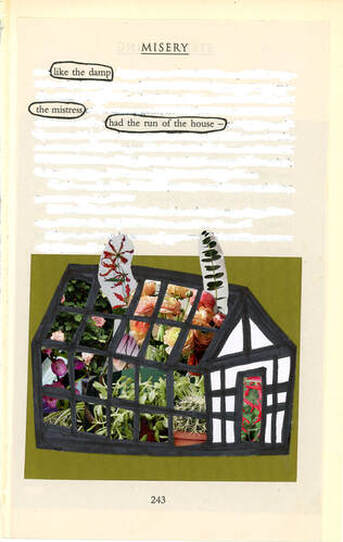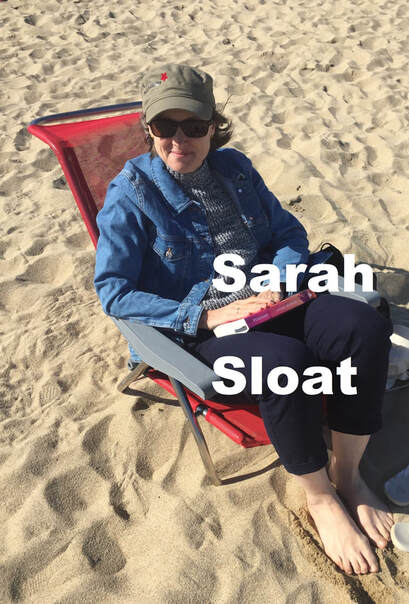|
Sarah Sloat's newest book, Hotel Almighty (Sarabande Books, 2020), is a collection of poems after erasing words from the famous American psychological horror novel Misery by Stephen King, along with her visual interpretations. She explains her erasure poetry techniques in the following essay, as well as in an insightful interview by Kelcey Parker Ervick. Erasure poetry was introduced to me when I was in college. Professors and students in my poetry community were really into erasing words until I graduated. My professor, David Dodd Lee, was erasing John Ashbery’s poems for his book And Others, Vaguer Presences: A Book of Ashbery Erasure Poems (2016, BlazeVox). At the moment, I could not find joy in excavating new meanings from someone else's work. I felt it was more of a game than composing new poems, and I somehow felt bad for erasing words from the original text. However, my thoughts on it had changed since 2009. I learned of many erasure approaches, but had decided the most crucial decision lies in choosing the right material to work with. I met Alison Thumel who used The Life-Changing Magic of Tidying Up, Marie Kondo’s 2014 self-help best-seller. When I read her works, I truly understood the sparkling nature of erasure poetry. Sarah's book choice for Hotel Almighty was really intriguing. Her erasure poems carry the spirit of Misery through her personal lens showcased with collages. This is the technical and dramatic pinnacle of erasure poetry. By Sarah Sloat Hotel Almighty began four years ago as part of a month-long found poetry challenge. Every poet who put her hand up was assigned a Stephen King book as a source text, and mine was Misery. It wasn’t part of my usual reading terrain. There are many ways to approach found poetry. You can use words from all over the book, you can shuffle words from a single page, you can pick out all the questions in the book and compose a list poem, or pluck every sentence beginning with something such as “the snow” and go for anaphora. Or you can do blackout poetry, retaining the order of the words in the source text on a page or across a series of pages. I wanted to keep things simple, so I took this approach, limiting myself to one page per poem. This gave me freedom to start anew every day. Blackout poetry sometimes involves literally blacking out unwanted words with a sharpie. But the poet can also white them out, or blue them out with a colored pencil. Taking an eraser to the page also works to a certain extent depending on the ink and paper, but never fully obliterates the unwanted text. For a rough idea of how I approached the poems in Hotel Almighty, I’d like to discuss one piece from the book, [Like the damp…], which uses page 243 of Misery (Hodder & Stoughton). Each time I went looking for a poem, I resisted reading the text and instead looked at it as a kind of inventory. I gathered a basket of nouns and verbs and any interesting phrases. It was important to disengage from the story, which I did read prior to starting the project. On page 243, the phrase “like the damp” perches in the top line, impossible to overlook. As any poet can tell you, the simile is a mighty tool and a great temptation. “Like the damp” was a promising start, though I tried other possibilities. As with all the poems, I kept ideas in a notebook rather than marking up the page since I often changed course or abandoned a false start. I consider myself lucky with Misery. Stephen King likes solid nouns and verbs. His prose is lively, it’s peppered with good choices. Moving down the page, could one ask for a better word than “mistress?” It’s a powerful word that quickly arranged itself as the subject of the poem. At one point another version of this poem was at least twice as long. But in the end I kept it punchy, limiting the text to a single sentence: like the damp / the mistress / had the run of the house With every piece, only when I settled on a text did I consider the visuals. I wanted each poem to work on its own and obscured the superfluous text before choosing visual elements. For this poem, I used correction fluid. Parallel to working on page 243, I was doing collages with flowers, mostly stuffing structures with plants and blossoms. Because I couldn’t be bothered to keep finding new houses to pack with greenery, I drew my own primitive houses. I had two versions of this collage, the one used in the poem and another full of red roses, which seemed a bit monotonous. It’s a primitive rather slapdash drawing, like a child might do. Correction fluid, too, for all its charm is not the tidiest way to make an erasure. When I look at it now I think, wow, could have been a little neater than that! But it grew on me, as Misery did. Like the damp, like a mistress. Sarah J. Sloat splits her time between Frankfurt and Barcelona, where she works as a news editor. Her book of visual poetry, Hotel Almighty, was recently published by Sarabande Books. You can keep up with her at sarahjsloat.com and on Twitter at @SJSloat.
Comments are closed.
|
Archives
July 2024
|
フジハブ
Welcome to FUJI HUB: Waystation to Poetry, Art, & Translation. This is not your final destination. There are many links to other websites here, so please explore them!
Welcome to FUJI HUB: Waystation to Poetry, Art, & Translation. This is not your final destination. There are many links to other websites here, so please explore them!
What are you looking for?
FUJI HUB Directory
Popular Sites:
Gallery of Graphic Poems
Working On Gallery
(Monthly New Article by Writers & Artists)
About Naoko Fujimoto
Contact
Naoko Fujimoto Copyright © 2024
FUJI HUB Directory
Popular Sites:
Gallery of Graphic Poems
Working On Gallery
(Monthly New Article by Writers & Artists)
About Naoko Fujimoto
Contact
Naoko Fujimoto Copyright © 2024





